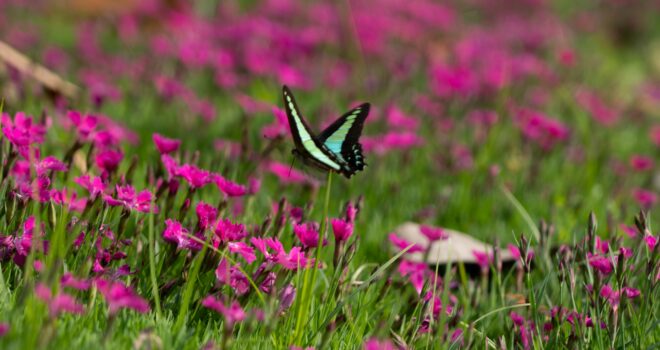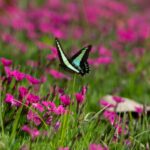The Declaration of Independence refers to “the pursuit of happiness” as an inalienable right, along with life and liberty. The words “pursuit” and “chase” differ in an important, though subtle, way. When we pursue something, we usually have it in our sight. A man pursues a particular woman. The word “chase,” on the other hand, has a broader meaning. A policeman can chase a robber, though he may not catch up to him. A romantic can chase something that is not there, such as a dream. He can chase happiness without every possessing it.
The Broadway show, Oh, Look!, that opened in 1918, featured the song, “I’m Always Chasing Rainbows.” Joseph McCarthy wrote the lyrics, and Harry Carroll is credited with adapting the melody from Chopin’s “Fantaisie Impromptu.” The lyrics refer to the potential futility of a “chase”: “At the end of every rainbow there’s happiness, and to find it how often I have tried, but my life is a race just a wild goose chase, and my dreams have all been denied.” The chorus echoes the opening lyrics as follows: “I’m always chasing rainbows, watching clouds drifting by. My schemes are just like all my dreams, ending in the sky.”
Why is it that chasing happiness can be an exercise in futility?” It is a poignant question since, as Aristotle stated, “All men desire happiness.” It is a grave misfortune that something that everyone desires can escape them. The key to understanding the paradox lies in the very word “happiness.” Happiness is not something that should be pursued or chased. It is something that simply happens. For Aristotle, it happens when people live a life of reason in accordance with virtue. Nathaniel Hawthorne framed it charmingly when he said that “Happiness is like a butterfly, which when pursued, is always beyond your grasp, but, if you will sit down quietly, it may alight upon you.”
The mistake that is commonly made is the belief that happiness is a direct object of choice. But if it were, everyone in the world would be exhilaratingly happy. Yet, happiness remains elusive. It is not like an apple hanging from a lower branch of a tree, waiting to be plucked. We must do something else before happiness happens. That something else, in a word, is love. Would it be too far-fetched to think of the Declaration of Independence combining life and liberty with love? Then, the expression, “the pursuit of happiness” would not be needed.
Liberty needs to be limited so that it does not violate life. One should not have the liberty to destroy human life. This is a point that has eluded even Supreme Court justices. In the Roe v. Wade (1973) and Planned Parenthood v. Casey (1992) decisions, by defining the person in terms of “autonomy,” the Court effectively relieved any person from the obligation to defend the liberty of others. As a consequence, liberty could violate life. Love, however, would ensure that liberty be shared so that liberty would never be opposed to life. Also, in the Casey decision, the joint opinion states, “At the heart of liberty is the right to define one’s own concept of existence, of meaning, of the universe, and the mystery of human life.” Such a free-wheeling concept of liberty reinforces the notion of autonomy. But autonomy and the protection of life are not in harmony with each other.
We can find more wisdom and balance in Broadway musicals. In the 1925 show, No, No, Nanette, one of the feature songs puts happiness in the right perspective: “I want to be happy, but I won’t be happy, till I make you happy too. Life’s really worth living, when we are mirth-giving.”
Life is “worth living, when we are mirth-giving” may sound corny, but it contains more wisdom than what is sometimes found in Supreme Court statements. When there is love, there is sharing, and this sharing is also harmonious with liberty. Life, liberty, and love represent a triumvirate of checks and balances. Liberty should not be so broad as to efface life.
St. Thomas Aquinas explains how the harmony of liberty, life, and love are based not on politics, but on the natural law (Summa Theologica, I-II, Q. 94, art. 2). The first precept of the natural law refers to something we have in common with all animals and plants, namely, a natural inclination to preserve ourselves in being. This fundamental inclination is the basis for our right to life. The second precept refers to something we have in common with all animals, that is, the inclination and capacity to have offspring and provide for their care and education. This is the basis for our right to love. The third precept of the natural law is proper to man. It is “a natural inclination to know the truth about God, and to live in a society.” This is the basis for our right to liberty.
Love tempers liberty so that it can be shared with others. Love also protects life. The harmonious triad of liberty, life, and love creates the path to happiness. Happiness is a reward, so to speak, for living life in a loving manner where liberty is properly honored. It will be futile to pursue or chase happiness directly. We should be more attentive to living a good life. Happiness will take care of itself.
Photo by Desmond Lian on Unsplash

















